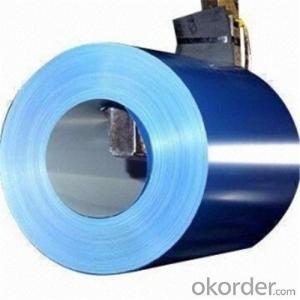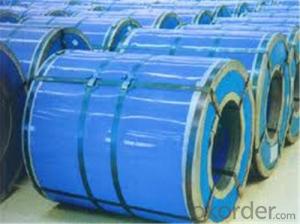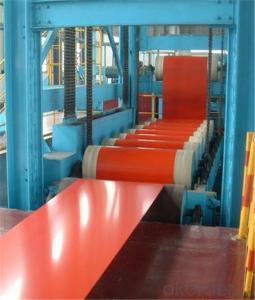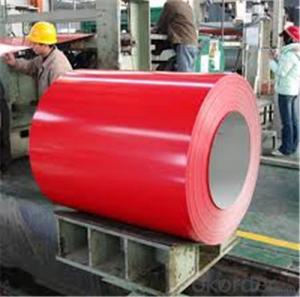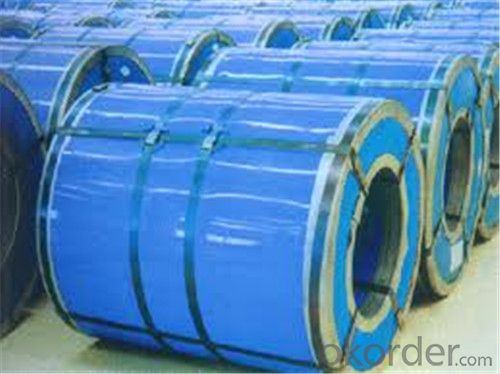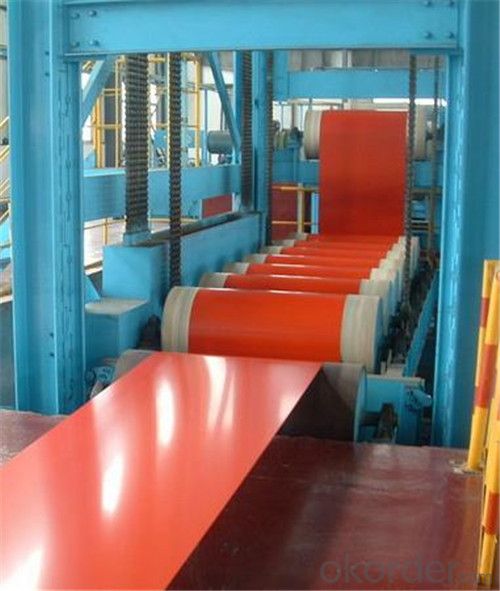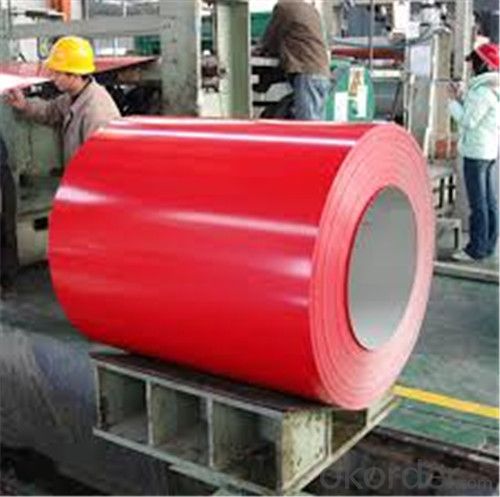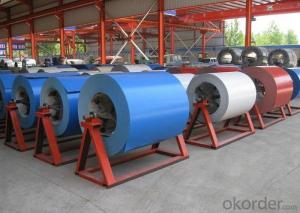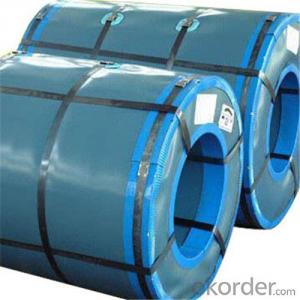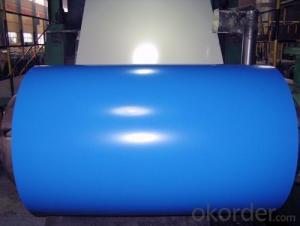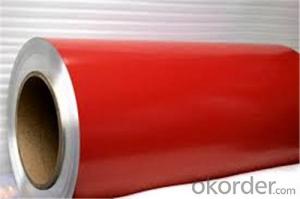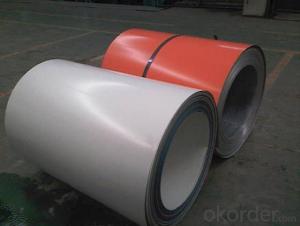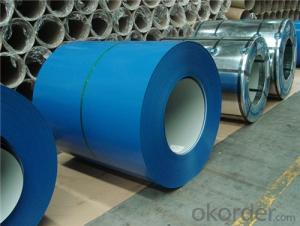Prepainted Rolled Steel Coil for construction Roofing constrution
- Loading Port:
- Shanghai
- Payment Terms:
- TT OR LC
- Min Order Qty:
- 50 m.t.
- Supply Capability:
- 30000 m.t./month
OKorder Service Pledge
OKorder Financial Service
You Might Also Like
Structure of Prepainted Rolled steel Coil for Construction Roofing
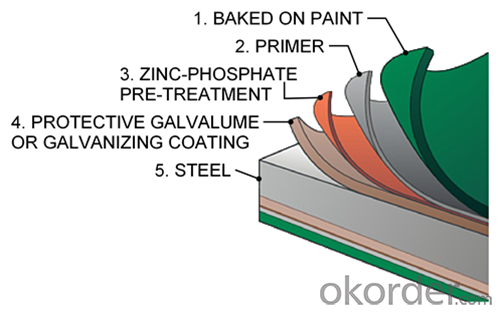
Description of Prepainted Rolled steel Coil for Construction Roofing
Prepainted Rolled steel Coil is a kind of coated steel coil/sheet. With the cold rolled steel of different strength and thickness as substrate, it is produced through applying Al-Zn coat on both faces by hot dip process. In its coating, Al accounts for about 55%, Si 1.6%, while the remaining is Zn. Aluminum zinc coils enjoys both the physical protective feature and durability of Al and the electrochemical protective property of Zn. And its surface has bright silver color and regular embossed-like figure, which are highly decorative.
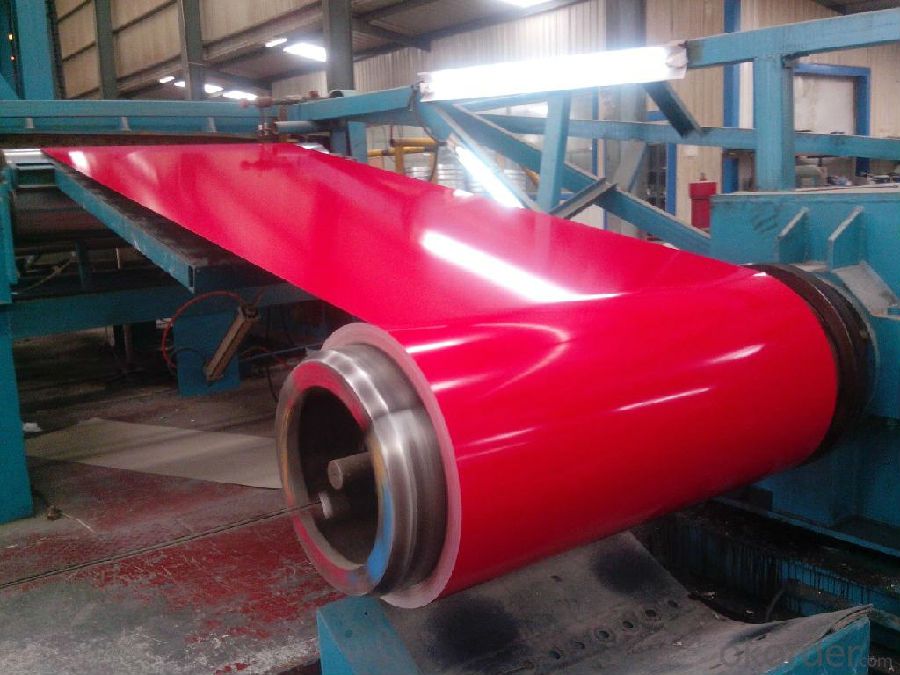
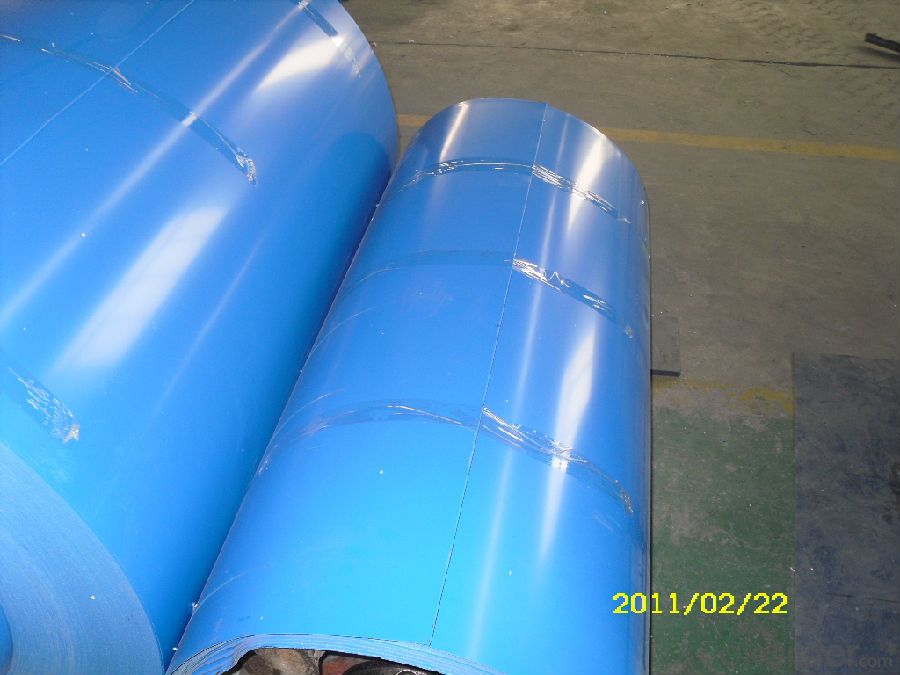
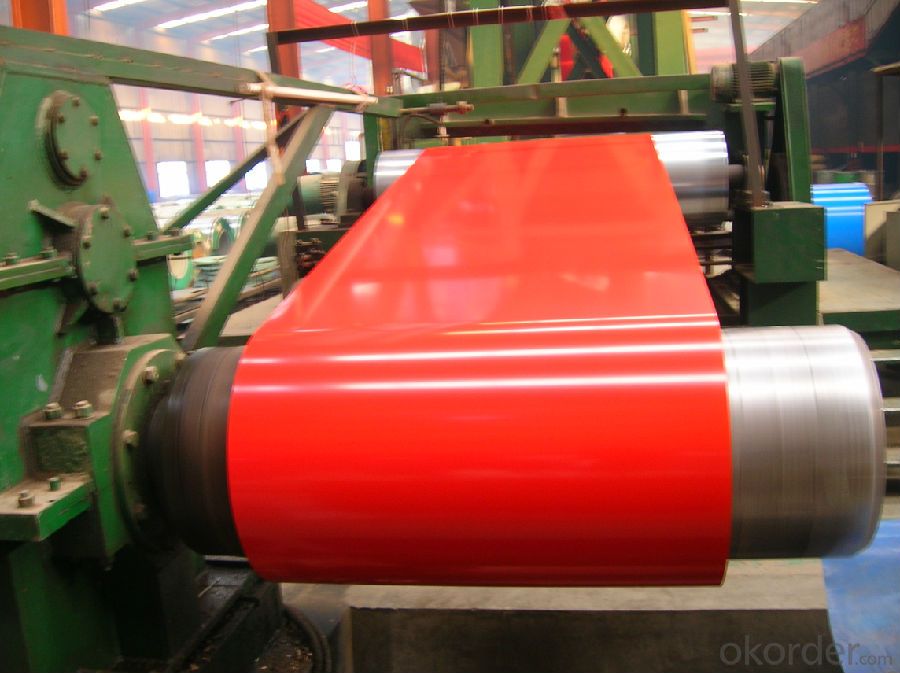
Main Feature of Prepainted Rolled steel Coil for Construction Roofing
1.Corrosion resistance: It mainly depends on the aluminum protection. When the zinc being worn, the aluminum will form a dense layer of aluminum oxide, resist corrosion material to prevent further corrosion inside.
2. Heat resistance: Aluminum zinc alloy steel sheet has excellent heat resistance, can withstand high temperatures over 300 centigrade, and is similar with aluminized steel high temperature oxidation resistance. It often used in chimney pipes, ovens, fluorescent lighting device and the device cover.
3. Heat reflective: Galvanized steel plate heat-reflective high rate is twice as galvanized steel, often used to make insulation materials.
4. Economy: Because density of 55% AL-Zn is smaller than the density of Zn, so in the same weight and thickness of Galvanized zinc layer, aluminum-zinc steel plate is larger area more than 3% of galvanized steel sheet.
Applications of Prepainted Rolled steel Coil for Construction Roofing
1. Construction and building: roofing; ventilating duct; handrail; partition panel;etc.
2. Electric appliance: refrigerator; washing machine; refrigerator; DVD;etc.
3.Transportation: oil tank; road sign; etc.
4.Agriculture:barn; etc.
5.Others:vending machine; game machine; etc.
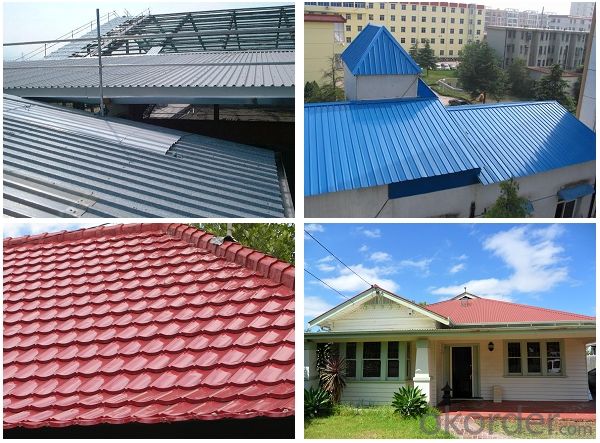
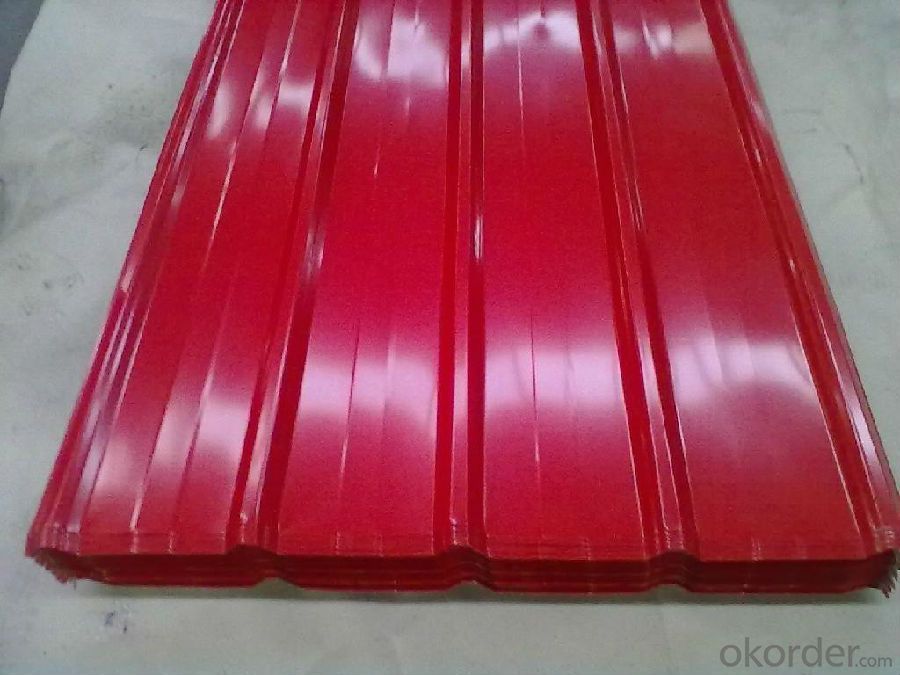
Specifications of Rolled steel Coil for Construction Roofing
Product | Prepainted Rolled steel Coil for Construction Roofing |
Material Grade | SGCC / SGCH / DX51D+AZ, etc |
Thickness | 0.2-3.0mm |
Width | 600-1500mm |
Tolerance | Thickness: +/-0.02mm , Width:+/-2mm |
Zinc-coating | AZ40-150g/m2 |
Technique | Raw material: Hot rolled steel coil --> Cold rolled_>hot dipped galvalume |
Surface | Dried, Chromated, Unoiled |
Spangle | Regular spangle , small spangle, zero spangle |
ID | 508MM |
Coil weight | 10MT max |
Export package | Cardboard inner sleeves, Waterproof paper, galvanized steel covered and steel strip packed |
FAQ of Prepainted Rolled steel Coil for Construction Roofing
We have organized several common questions for our clients,may help you sincerely:
1. What is the minimum order quantity ?
Our MOQ is 50mt for each size. And we will consider to give more discount if you make big order like 1000 tons and more. Further more, the more appropriate payment term your offer the better price we can provide.
2. How long can we receive the product after purchase?
Usually within thirty working days after receiving buyer’s advance payment or LC. We will arrange the factory manufacturing as soon as possible. The cargo readiness usually takes 15-25 days, but the shipment will depend on the vessel situation.
3. How to guarantee the quality of the products?
We have established the international advanced quality management system,every link from raw material to final product we have strict quality test;We resolutely put an end to unqualified products flowing into the market. At the same time, we will provide necessary follow-up service assurance.
- Q: What is the maximum width of a steel coil?
- The maximum width of a steel coil can vary depending on the specific manufacturing capabilities and equipment being used. However, in general, steel coils can have widths ranging from a few inches to several feet.
- Q: What are the environmental considerations when using steel coils?
- Some environmental considerations when using steel coils include the emissions and energy consumption associated with the production and transportation of the coils, as well as the potential for waste generation during processing and disposal. It is important to ensure that steel production practices adhere to sustainable and eco-friendly standards to minimize the environmental impact. Additionally, proper handling and recycling of steel coils at the end of their life cycle is crucial to reduce resource depletion and waste accumulation.
- Q: How do steel coils contribute to sustainable construction?
- Steel coils contribute to sustainable construction in several ways. Firstly, steel is a highly durable material that can withstand extreme weather conditions and resist corrosion, leading to longer-lasting structures. This durability reduces the need for frequent repairs and replacements, thereby reducing waste and conserving resources. Secondly, steel is a recyclable material, meaning that at the end of a building's life cycle, the steel used in its construction can be easily and efficiently recycled. This reduces the demand for new steel production, which is energy-intensive and releases greenhouse gases. By using steel coils made from recycled steel, the construction industry can significantly reduce its environmental impact. Additionally, steel coils are versatile and can be shaped and formed into various structural components, allowing for efficient use of materials and minimizing waste. The lightweight nature of steel coils also makes transportation and handling more cost-effective and environmentally friendly. Furthermore, using steel coils in construction can contribute to energy efficiency. Steel has excellent thermal conductivity, which means it can effectively transfer and distribute heat, enabling better insulation and reducing energy consumption for heating and cooling. Overall, steel coils play a vital role in sustainable construction by promoting durability, recyclability, efficient material usage, and energy efficiency.
- Q: What are the challenges in coil recoiling for high-strength steel?
- There are several challenges associated with coil recoiling for high-strength steel. Firstly, high-strength steel is known for its increased hardness and strength, which makes it more difficult to coil compared to regular steel. The higher tensile strength of high-strength steel puts more stress on the recoiling equipment, leading to potential damage or failure of the machinery. Secondly, high-strength steel tends to have lower ductility, meaning it is less able to withstand deformation without fracturing. Recoiling high-strength steel coils requires careful handling and control to prevent any excessive bending or stretching that could cause the material to break or crack. Another challenge is the shape memory effect of high-strength steel. This phenomenon causes the material to return to its original shape after being deformed. While this property can be advantageous in some applications, it complicates the recoiling process as the steel coil may resist being reshaped into a new coil form. Furthermore, high-strength steel often has a more complex microstructure compared to regular steel, with different phases and grain boundaries. This complexity can make the recoiling process more challenging as it may affect the material's mechanical properties and response to deformation. Lastly, the surface finish of high-strength steel coils is critical for many applications. Recoiling can introduce surface defects, such as scratches or marks, which may affect the functionality or appearance of the final product. Therefore, maintaining a high-quality surface finish during the recoiling process is a significant challenge. In summary, the challenges in coil recoiling for high-strength steel include the increased stress on recoiling equipment, lower ductility, shape memory effect, complex microstructure, and the need for a high-quality surface finish. Overcoming these challenges requires specialized equipment, precise control, and careful handling to ensure the integrity and quality of the recoiled high-strength steel coils.
- Q: How are steel coils used in the production of agricultural structures?
- Due to their exceptional strength and durability, steel coils find extensive use in the production of agricultural structures. These coils, typically composed of high-quality steel, have various applications within the agricultural industry. One major application of steel coils in agricultural structures involves the construction of buildings and storage facilities. By using steel coils, farmers can create robust frameworks that support the walls and roofs of these structures. The inherent strength of steel allows for the construction of spacious areas without the need for excessive support columns, providing farmers with ample storage space for their crops, machinery, and livestock. Furthermore, steel coils play a crucial role in the manufacturing of agricultural equipment and machinery. Whether it be tractors, plows, harvesters, or irrigation systems, steel coils are essential in the fabrication of these tools. The high tensile strength of steel ensures that these agricultural machines can endure the rigorous conditions of farming, including heavy loads, rough terrains, and exposure to harsh weather elements. Moreover, steel coils are also indispensable in the production of fencing and enclosures for agricultural purposes. Whether it's safeguarding crops from animals or establishing boundaries for livestock, steel coils are a vital component in constructing robust and reliable fences. The strength of steel guarantees that these fences can withstand the pressure from animals, preventing them from breaking through and causing harm to the crops or escaping. In conclusion, steel coils are a vital component in the production of agricultural structures and equipment. Their strength, durability, and versatility make them an ideal material for constructing buildings, manufacturing machinery, and creating fences in the agricultural industry.
- Q: How are steel coils processed for edge trimming or slitting during processing?
- Steel coils are processed for edge trimming or slitting during processing by using specialized machinery. The coils are uncoiled and fed through a slitting machine, which cuts the coil into narrower strips. These strips are then passed through an edge trimming machine, which removes any irregularities or excess material from the edges. This process helps to ensure that the steel coils meet the desired specifications and are ready for further processing or use in various industries.
- Q: How are steel coils used in the production of industrial boilers?
- Steel coils are used in the production of industrial boilers to form the main body and components of the boiler, providing strength and durability. The coils are first shaped into the desired boiler structure, such as the shell and tubes, and then welded together to create a sturdy and leak-proof vessel. Additionally, the coils are often used to manufacture the heat exchangers and other critical parts of the boiler, ensuring efficient heat transfer and reliable operation.
- Q: What are the different grades of steel coils?
- There are various grades of steel coils available, including low carbon steel, medium carbon steel, high carbon steel, stainless steel, and galvanized steel coils. Each grade has specific properties and applications, making them suitable for different industries and purposes.
- Q: How do steel coil manufacturers handle custom orders?
- Steel coil manufacturers handle custom orders by following a systematic process that involves understanding the specific requirements of the customer, designing and producing the custom coils, and ensuring quality control throughout the manufacturing process. Firstly, when receiving a custom order, manufacturers must thoroughly understand the customer's specific needs. This involves detailed communication and collaboration with the customer to gather information about the desired specifications, dimensions, tolerances, and other special requirements. Manufacturers may also provide technical expertise and guidance to the customer to ensure that the custom order can be successfully produced. Once the requirements are clearly defined, manufacturers proceed with designing and engineering the custom steel coils. This involves utilizing advanced software and engineering tools to create detailed designs and specifications that meet the customer's unique needs. Manufacturers may also create prototypes or samples for the customer's approval before proceeding with full-scale production. After the design phase, manufacturers begin the production process. This typically involves sourcing the appropriate raw materials, such as steel coils of the required composition and thickness. The coils are then processed through various manufacturing stages, including cutting, shaping, and forming, to achieve the desired dimensions and shapes. Specialized equipment and machinery are used to ensure precision and accuracy throughout the production process. Quality control is a crucial aspect of handling custom orders. Manufacturers conduct rigorous inspections and testing procedures at various stages of production to ensure that the custom coils meet the customer's specifications and industry standards. This includes checking for dimensional accuracy, surface finish, mechanical properties, and any other specific requirements set by the customer. Manufacturers may also involve third-party inspection agencies or provide customers with test reports and certifications for quality assurance. Finally, once the custom steel coils are manufactured and pass all quality checks, they are carefully packaged and delivered to the customer. Manufacturers ensure proper packaging and shipping methods to prevent any damage during transit and ensure the coils reach the customer in optimal condition. In summary, steel coil manufacturers handle custom orders by closely collaborating with customers, designing and engineering specialized coils, ensuring quality control throughout the production process, and delivering the custom coils to the customer's satisfaction. This systematic approach allows manufacturers to meet the unique requirements of each customer and deliver high-quality custom steel coils.
- Q: What is the role of steel coils in the production of appliances?
- The role of steel coils in the production of appliances is to provide a strong and durable material for various components, such as the outer body, internal structures, and key parts. Steel coils are used to manufacture appliance parts like panels, frames, and brackets, ensuring stability, strength, and longevity. The versatility and strength of steel make it an ideal choice for appliances, as it can withstand heavy loads and provide the necessary support and protection.
Send your message to us
Prepainted Rolled Steel Coil for construction Roofing constrution
- Loading Port:
- Shanghai
- Payment Terms:
- TT OR LC
- Min Order Qty:
- 50 m.t.
- Supply Capability:
- 30000 m.t./month
OKorder Service Pledge
OKorder Financial Service
Similar products
Hot products
Hot Searches
Related keywords
